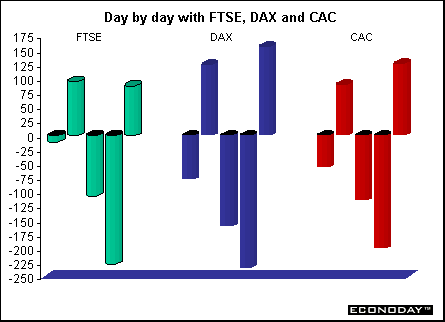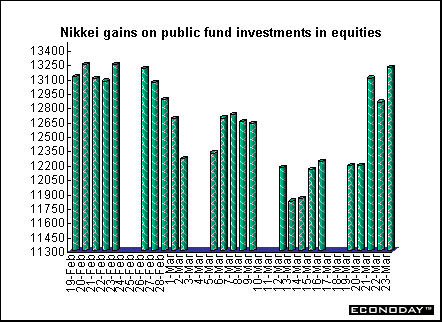 |

Europe
What started out as a relatively benign week turned into a rout on Wednesday, as the indexes followed here ricocheted ever lower as investors reacted to the Federal Reserve's 50 basis point interest rate cut. British and European investors didn't like it anymore than U.S. investors did on Tuesday. Then the Frankfurt DAX, Paris CAC and the London FTSE 100 index sank further on doubts over earnings and economic data, which are expected to grow weaker yet.. European stocks dropped after a broad range of companies said profits would drop because of slowing economic growth. European Central Bank President Wim Duisenberg suggested that European growth may be affected by worse than expected weakness in the U.S. economy, finally recognizing that the U.S. slowdown is going to have a significant impact on Europe. The consensus opinion was that if the policy makers of the European Central Bank aren't thinking of cutting interest rates to spur economic activity, they should be.

European and British equities rallied Friday at the end of a disastrous week that saw many fall into bear market territory. Technology and telecommunications stocks led the rebound, but analysts were wary about the strength of the recovery, adding that investors would be looking for signs of a recovery in the U.S. economy before any confidence was restored in the market.
Asia
Japanese stocks proved to be a one day wonder on Wednesday. The Nikkei rocketed as public funds moved into the market following easing moves by the Bank of Japan and a top level government promise to push the nation's banks to clean up their bad loan mess. The Nikkei 225 average soared 912.97, or 7.5 percent, to finish at 13103.94, its seventh largest percentage gain ever and the largest point gain since January 16, 1998. The Nikkei had hit 16 year lows just a few days earlier. At first, the Nikkei dropped as Tuesday's U.S. stock declines blunted the positive reaction to the Bank of Japan's announcement on Monday. But the Tokyo market turned higher as what appeared to be public funds stepped in with aggressive buying. Traders said postal savings and insurance funds apparently bought stocks to enhance market gains from Monday's "quantitative easing" by the Bank of Japan and Prime Minister Yoshiro Mori's pledge to U.S. President George W. Bush to clean up bad debts swiftly and boost domestic demand.

 |


Introduction • Global Stock Market Indexes • Recap of Global Markets • Currencies • Indicator Scoreboard

The Bottom Line • Looking Ahead
|
 |